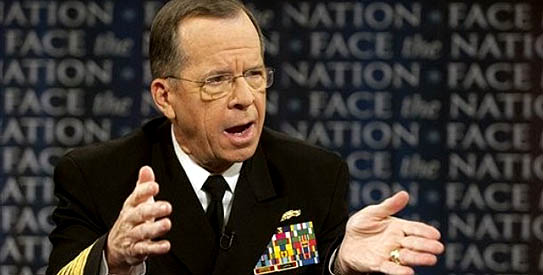
FORWARD OPERATING BASE SALERNO, Afghanistan: US and Pakistani leaders agree they cannot afford to let security ties unravel, the top US military officer said on Tuesday, even as he acknowledged persistent strains including Pakistani links to insurgents staging attacks in Afghanistan.
Admiral Mike Mullen, chairman of the US military's Joint Chiefs of Staff, made the comments before a trip to Islamabad as he visited US bases in Afghanistan.
Washington has long accused elements of Pakistan's Inter-Services Intelligence (ISI) of maintaining ties with the Haqqani network, an issue that Mullen said he would again raise in talks on Wednesday with Pakistan's army chief, General Ashfaq Kayani.
“We're working our way through the relationships that the ISI has with the Haqqani network and the strain that that creates,” Mullen said, even as he cited battlefield gains reducing the group's mobility.
“I'll see General Kayani here shortly and these are issues I address with him every single time we engage. And I certainly intend to (raise that) this week.”
Pakistan has long demanded a say in any peace settlement in Afghanistan. Analysts believe Islamabad sees groups such as the Haqqani network as a way to ensure it can influence any future deal —and check any rival advances in Kabul by India, Pakistan's arch-rival.
But the Haqqani network is only one of the irritants in the US-Pakistan relationship, along with Pakistani concerns over US drone attacks and espionage that have dominated headlines recently and intensified anti-American sentiment there.
The case of a CIA contractor, Raymond Davis, who killed two Pakistanis brought anger to boiling point and challenged the CIA's campaign of aerial drone strikes against militants in Pakistan's tribal areas.
Pakistan is also seeking a cut in the number of US Special Forces trainers working in sensitive regions, an issue raised by the ISI chief, Lieutenant-General Ahmad Shuja Pasha, at talks at CIA headquarters last week.
TURBULENT TIME Mullen acknowledged that “we've had a very turbulent time,” but added that despite the tensions, all sides acknowledged the relationship was vital.
“I think that all of us believe that we cannot afford to let this relationship come apart,” Mullen said, referring to US and Pakistani military and intelligence chiefs.
“It's just too dangerous. It's too dangerous, in each country, for each country. It's too dangerous for the region.”
He acknowledged that the relationship was difficult, but added: “We walk away from it at our peril, quite frankly.”
Asked about Pakistani demands to trim the number of US military trainers, who Pakistan fears could be involved in covert action, Mullen said he still saw continued US training support in the future.
He did not offer specifics and said the matter still needed to be ironed out.
Mullen's visit to Afghanistan and Pakistan comes as the United States enters a delicate phase of the unpopular, nearly 10-year-old war.
US officials are preparing plans to start withdrawing troops in July, with the goal of handing lead security responsibility to Afghan forces by the end of 2014. But they are also bracing for heavy fighting ahead.
“I've been very straight with the American people with respect to that. I think our losses which were significant last year will be this year as well,” Mullen said.
“That said, the Taliban had a really tough year last year. They're going to have a tougher one this year.”
US commanders in Afghanistan cited increased cooperation at a tactical level on both sides of the Afghan-Pakistan border.











































Dear visitor, the comments section is undergoing an overhaul and will return soon.